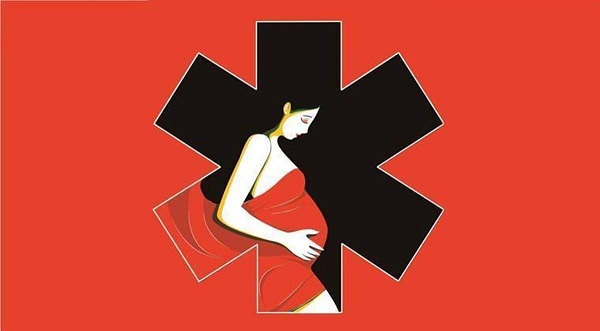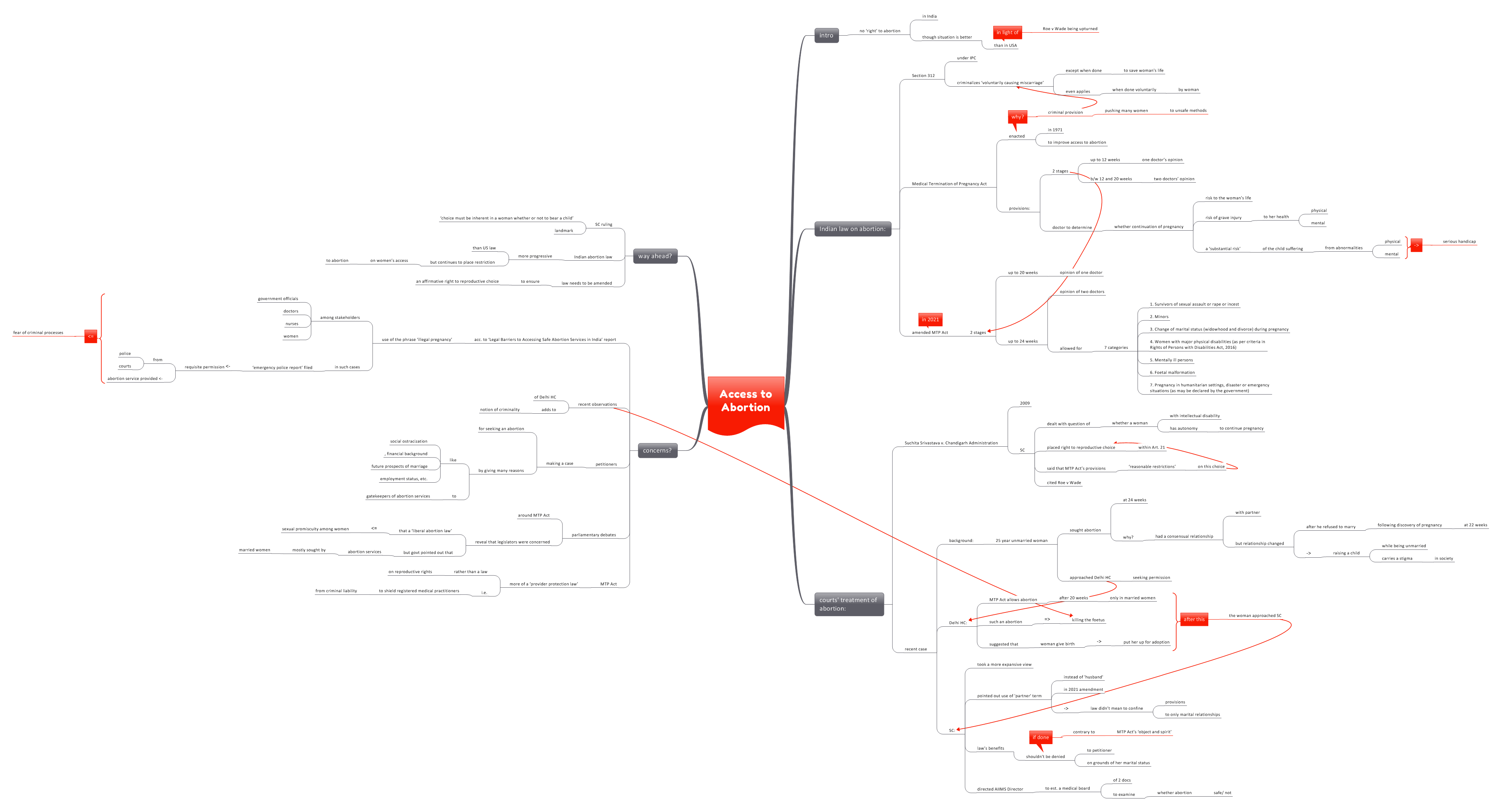Access to Abortion

In light of the recent US Supreme Court ruling on Roe v. Wade, many were relieved that they were in India where abortion was atleast not criminalized. However, there is no ‘right’ to abortion in India either. This issue came into light when a 25 year old woman moved the top court seeking an abortion after the Delhi High Court refused to grant permission.
What is India’s law on abortion?
- Under IPC, Section 312 criminalizes ‘voluntarily causing miscarriage’, except when done to save the woman’s life. This applies even if the woman consents to the miscarriage.
- The Medical Termination of Pregnancy Act was enacted in 1971 to improve access to abortion. This Act was introduced as the criminal provision was pushing many women to resort to unsafe methods for terminating pregnancy.
- This Act allowed abortion by medical practitioners in 2 stages:
-
- For abortion of pregnancy up to 12 weeks, one doctor’s opinion was required.
- For abortion of pregnancy between 12 and 20 weeks, two doctors’ opinion was required.
- The doctor has to determine whether the continuation of pregnancy would
- Pose a risk to the woman’s life or a risk of grave injury to her health- physical or mental
- Mean a ‘substantial risk’ of the child suffering from physical or mental abnormalities leading to serious handicap
- The MTP Act was amended in 2021 to make the following changes:
- Abortion of pregnancy up to 20 weeks under the opinion of one doctor
- Abortion of pregnancy up to 24 weeks under the opinion of two doctors
- Under the second category, 7 categories of women are eligible for seeking abortion:
-
- Survivors of sexual assault or rape or incest
- Minors
- Change of marital status (widowhood and divorce) during pregnancy
- Women with major physical disabilities (as per criteria in Rights of Persons with Disabilities Act, 2016)
- Mentally ill persons
- Foetal malformation
- Pregnancy in humanitarian settings, disaster or emergency situations (as may be declared by the government)
How have the Indian courts treated the question of abortion?
- The Supreme Court and the High Courts have been routinely engaging with the question of abortion. Though India hasn’t seen a case similar to Roe v Wade, women who have been denied abortion under the MTP Act approach the courts for permission.
- In Suchita Srivastava v. Chandigarh Administration, 2009, the Supreme Court dealt with the question of whether a woman with intellectual disability has autonomy to continue her pregnancy. The court placed the right to reproductive choice within Article 21 of the Constitution.
- The court held that the MTP Act’s provisions were ‘reasonable restrictions’ on this choice. Notably, in the 2009 case, the court cited Roe v Wade.
Recent Case:
- In the recent case, a 25 year unmarried woman had approached the Delhi High Court seeking an abortion at 24 weeks.
- Her plea was that, though she had had a consensual relationship with her partner, her relationship with her partner had changed. Her partner had refused to marry her after the discovery of her pregnancy at 22 weeks.
- The woman pled that raising a child while being unmarried carries a stigma in the society and hence, would like to terminate the pregnancy.
- The Delhi HC held that the MTP Act allows abortion after 20 weeks only in married women and that the court cannot go beyond the statute.
- The court held that such an abortion would amount to killing the foetus. The bench suggested that the woman give birth to the child and put her up for adoption.
- Following this judgement, the woman approached the Supreme Court.
- The top court took a more expansive view of the case. The SC bench pointed out the use of the term ‘partner’, instead of ‘husband’, as per the 2021 amendment. This shows that the law didn’t mean to confine the provisions to only marital relationships.
- The SC held that the law’s benefits shouldn’t be denied to the petitioner on grounds of her marital status. Doing so would be contrary to the MTP Act’s ‘object and spirit’.
- The court directed AIIMS Director to set up a medical board of two doctors to examine the woman and determine whether an abortion would be a safe option.
What is the concern?
- The ‘Legal Barriers to Accessing Safe Abortion Services in India’ report noted the use of the phrase ‘illegal pregnancy’ often among government officials, doctors, nurses and women. The report noted that in such cases, an ‘emergency police report’ was first filed and an abortion was performed only after receiving requisite permission from the police or the court.
- This shows the prevalent fear of criminal processes.
- The recent observations by the Delhi HC, that the abortion would be ‘akin to killing the child’, adds to this notion of criminality.
- There is also a concern over how petitioners are making a case for seeking an abortion. Experts question whether a woman has to state reasons, like social ostracization, financial background, future prospects of marriage, employment status, etc., to the gatekeepers of abortion services.
- Parliamentary debates around the MTP Act reveal that legislators were concerned that a ‘liberal abortion law’ would encourage sexual promiscuity among women. However, the government addressed this concern by stating that abortion services are sought mostly by married women.
- In addition to this, the MTP Act is viewed more of a ‘provider protection law’, rather than a law focused on women’s reproductive rights. This means that the law is primarily to shield registered medical practitioners from criminal liability.
What is the way ahead?
- The Supreme Court’s ruling that ‘choice must be inherent in a woman whether or not to bear a child’ is a landmark decision.
- The Indian abortion law is more progressive than the US law. However, it continues to place restriction on women’s access to abortion.
- The law needs to be amended to ensure an affirmative right to reproductive choice.
Practice Question for Mains
What are the provisions of the 2021 amended MTP Act? Discuss in light of the recent Supreme Court ruling on reproductive rights of unmarried women. (250 words)
If you like this post, please share your feedback in the comments section below so that we will upload more posts like this.


